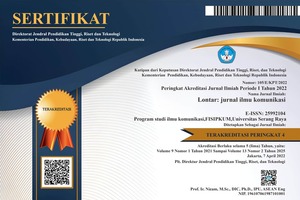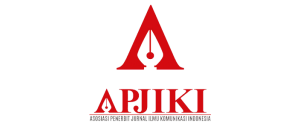Fenomena Linguistik dalam Realitas Sosial Budaya di Era Covid-19
DOI:
https://doi.org/10.30656/lontar.v10i1.4541Keywords:
Covid-19, Linguistics, Language, CommunicationAbstract
The Corona Virus, also known as COVID-19 (Corona Virus Diseases 2019), is a very common infection these days. Currently, all fields are related to COVID-19, including the field of language that highlights the use of terms used in everyday communication, in prevention and treatment efforts, and the tools used that are widely emerging. Some of these terms, some of which have been around for a long time but whose use is becoming popular at this time, are also new terms that emerged during the Coronavirus outbreak. The emergence of these linguistic terms shows that language is productive and dynamic so that its development is appropriate and in line with the situation and conditions that occur. The linguistic term related to COVID-19 appears as a description of what is happening and an expression of an effort to prevent the spread of the Coronavirus. However, behind the function of language as a very basic communication tool, namely the description of something or what is happening, there are also language polemics such as negligence in the use of terms and cultural puns that can be interpreted negatively by the interlocutor. This research is qualitative descriptive research using the discourse analysis method. The data obtained are interpreted by involving language theory. From the results of the analysis, at least many things related to language that have emerged related to COVID-19 include word forms, phrases, acronyms, patient status domains, actions, equipment, and regions. In addition, several polemics have also emerged, such as the categorization of linguistic symbols, the omission of symbols, and cultural play.
References
Alwasilah, C. (1985). Linguistik: Suatu Pengantar (Angkasa (ed.)).
Andreas, E. (2011). Bahan Kuliah Ilmu Sosial Budaya Dasar. Dalam Djoko Pontjo Hardani. Universitas Jember.
Barker, C. (2000). cultural studies: Teori dan Praktik. oleh Nurhadi 2004 (Terjemahan). Kreasi Wacana.
Birch, D. (1996). Critical Linguistics as Cultural Process. Dalam James, J.E. (Ed.), The Language Culture Connection. SEAMOE Reagional Centre.
Cavallaro, D. (2001). Teori Kritis & Teori Budaya. Oleh Laily Rahmawati (2004) (Terjemahan). Niagara.
Chaer, A. (1994). Linguistik Umum. Rineka Cipta.
Endraswara, S. (2006). Metode, Teori, Teknik, Penelitian Kebudayaan. Pustaka Widyatama.
Fowler, R. (1986). Linguistic Criticism. Oxford University Press.
KBBI. (1994). Kamus Besar Bahasa Indonesia (D. P. dan Kebudayaan (ed.)). Balai Pustaka.
Kepmenkes RI. (2020). Pedoman Pencegahan dan Pengendalian Corona Virus Desease 2019 (COVID-19).
Paton, B. (2020). Social Change and Linguistic Change: The Language of Covid-19. https://public.oed.com/blog/the-language-of-covid-19/
Puspahaty, N. (2017). Perubahan Bahasa di Lingkungan Kecamatan Cibasuh. Makna, 2(1), 77–87.
Rezkisari, I. (2020). Istilah Baru Kemenkes dan Potensi Lonjakan Angka Covid-19. https://republika.co.id/berita/qdhgpu328/istilah-baru-kemenkes-dan-potensi-lonjakan-angka-covid19
Santoso, A. (2007). Ilmu Bahasa dalam perspektif kajian Budaya. Bahasa Dan Seni, 35(1).
Storey, J. (1993). Teori Budaya dan Budaya Pop: Memetakan Lanskap konseptual cultural studies. Oleh Dede Nurdin (2003) (Terjemahan). Qalam.
Sugiono, P. D. (2017). Metode Penelitian Bisnis: Pendekatan Kuantitatif , Kualitatif, Kombinasi, dan R&D. CV. Alfabeta.
Sutopo, H. B. (2006). Penelitian Kualitatif: Dasar Teori dan Terapannya dalam Penelitian. Universitas Sebelas Maret.
Suwito. (1983). Pengantar Awal Sosiolinguistik, Teori dan Problema. Henary Offset.
Wardaugh, R. (1986). An Introduction to Sociolinguistics. Basil Blackwell.
Yuliana, Y. (2020). Corona Virus Deseases (Covid-19): Sebuah Tinjauan Literatur. Welness And Healty Magazine, 2(1), 187–192.
Yunus, N. R., & Rezki, A. (2020). Kebijakan Pemberlakuan Lock Down sebagai Antisipasi Penyebaran Corona Virus Covid-19. Salam: Jurnal Sosial Dan Budaya Syiar-I, 7(3).
Yusup, D. K., Badriyah, M., Suyandi, D., & Asih, V. S. (2020). Pengaruh Bencana Covid-19, Pembatasan Sosial, dan Sistem Pemasaran Online terhadap Perubahan Perilaku konsumen dalam Membeli Produk Retail. I(1), 1–10. http://digilib.uinsgd.ac.id
Zulprianto. (2020). Kebingungan Linguistik di Tengah Wabah. https://inioke.com/kebingungan-lingusitik-di-tengah-wabah/
Downloads
Published
Issue
Section
License
By submitting an article to the journal, the author(s) agree to transfer the published article's copyright to the journal, which will act as the publisher. This means the journal will have the right to publish the article in various forms, including reprints. The journal will maintain the publishing rights to the published articles.
In line with the license, authors and third parties (readers, researchers, and others) are allowed to share and adapt the material. In addition, the material must be given appropriate credit, provided with a link to the license, and indicated if changes were made. If authors remix, transform, or build upon the material, authors must distribute their contributions under the same license as the original.






